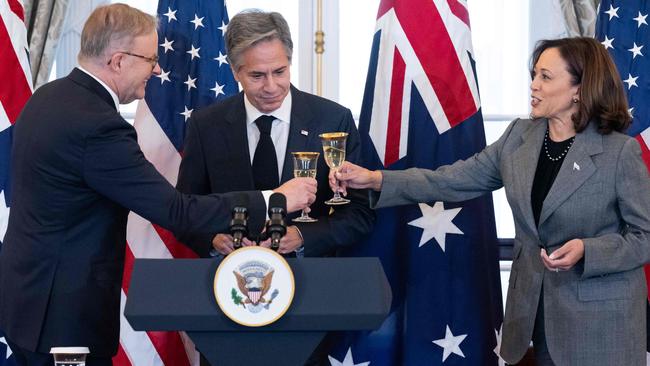Australians back Kamala Harris over Donald Trump, as support for renewables transition wanes
Almost 60 per cent of Australians are backing Kamala Harris to beat Donald Trump in the US election, with nearly half of voters believing a victory by the Vice-President would deliver better outcomes for Australia.

Almost 60 per cent of Australians are backing Kamala Harris to beat Donald Trump in the November US election, with nearly half of voters believing a victory by the US Vice-President would deliver better outcomes for Australia.
A new poll of 1611 voters testing local sentiment ahead of the US election found 22 per cent of Australians would prefer Mr Trump to return to the White House, with 58 per cent in favour of Ms Harris and 20 per cent neutral.
The SECNewgate Research Mood of the Nation survey, conducted between September 10-14, said 44 per cent of voters felt a Democratic win would be good for Australia compared to 18 per cent for Mr Trump. Just under 40 per cent of voters felt a victory for either candidate made no difference or expressed no opinion.
“If it were up to Australians, Kamala Harris would be elected in a landslide – our results show that 58 per cent would prefer a Kamala victory and just 22 per cent are hoping Donald Trump wins. Her support is strong across all demographics, and this includes Labor, Greens and Coalition voters,” the survey findings said.
The national poll, which shows the Victorian Labor government is performing the worst in the country, included a boosted sample of 603 voters in Queensland ahead of next month’s election.
With Labor Premier Steven Miles on track for a heavy defeat against David Crisafulli, the survey found cost-of-living, youth crime and housing affordability will be vote-defining issues for Queenslanders.
Two-thirds of Queensland voters believe the state is heading in the wrong direction and are concerned about healthcare decline, poor government management, overpopulation and inadequate infrastructure.
Outside of cost-of-living issues, a majority of women, voters aged 18-34 and Labor supporters ranked housing and rental affordability among their most important state election priorities.
Ahead of next year’s federal election, only 47 per cent of voters feel positive about the renewables transition, with 27 per cent negative. One in five voters believe the renewables transition is moving too quickly, with 48 per cent saying it is moving too slowly.
Support for nuclear energy rose to 39 per cent, indicating that “people believe consideration of nuclear should not be taken off the policy table”.
Peter Dutton’s Coalition has narrowed the gap on Anthony Albanese’s Labor on which party is best to manage the cost-of-living crisis. In September 2022, voters ranked the ALP ahead of the Coalition at 43 per cent compared to 22 per cent. This month’s poll showed Labor holding a one-point lead over the Liberals and Nationals at 30 per cent versus 29 per cent.
Breaking down the top cost-of-living concerns, the poll ranked grocery prices as the No.1 issue ahead of electricity bills, insurance premiums, petrol prices, water bills, gas bills, rent, mortgage repayments and road tolls.
“Predictions for the economy remain largely pessimistic. Nearly half think the economy will worsen in three months … with only 10 per cent feeling it will improve in the short term.”
Voters continue to rank down the Albanese government’s performance, with only 32 per cent saying it is doing an excellent, very good or good job.
Peter Malinauskas’s government in South Australia is the best supported, ahead of Roger Cook in Western Australia and Chris Minns in NSW.
Victorian Premier Jacinta Allan’s state recorded the lowest confidence across the nation.
Debt-laden Victoria is languishing at the bottom of the pack on a range of measures – only 35 per cent feel the state is heading in the right direction, while 26 per cent rate the Victorian government’s performance as being “good” or better”.




To join the conversation, please log in. Don't have an account? Register
Join the conversation, you are commenting as Logout